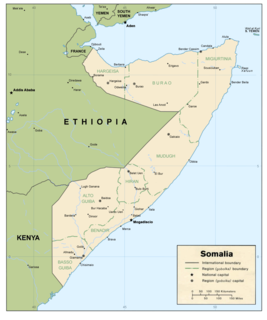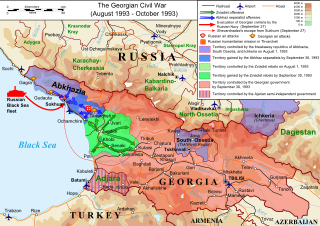 W
WThe 1969 Somali coup d'état was the bloodless takeover of Somalia's government on 21 October 1969 by far-left military officers of the Supreme Revolutionary Council led by Siad Barre. Somali troops supported by tanks under the command of Barre stormed Mogadishu and seized key government buildings and ordered the resignation of the country's leaders. The coup deposed President Sheikh Mukhtar Mohamed Hussein and Prime Minister Mohammad Egal and led to the twenty-one year long military rule by Barre and the imposition of a Marxist-Leninist government in Somalia until 1991.
 W
WThe Algerian Civil War was a civil war in Algeria fought between the Algerian Government and various Islamist rebel groups from 26 December 1991 to 8 February 2002. The war began slowly as it first appeared the government had successfully crushed the Islamist movement, but armed groups emerged to fight jihad and by 1994, violence had reached such a level that it appeared the government might not be able to withstand it. By 1996–97, it had become clear that the Islamist resistance had lost its popular support, although fighting continued for several years after.
 W
WThe Central African Republic Bush War was a civil war in the Central African Republic between Union of Democratic Forces for Unity (UFDR) rebels and government forces. The rebellion began after François Bozizé seized the nation's presidency in 2003. Actual fighting began in 2004. Around 10,000 people were displaced because of the civil unrest.
 W
WThe Central African Republic conflict is an ongoing civil war in the Central African Republic (CAR) involving the government, rebels from the Séléka coalition, and anti-balaka militias.
 W
WThe communist insurgency in Myanmar was a conflict fought primarily by the Communist Party of Burma and the Communist Party (Burma) from 1948 to 1988. The conflict ended when the armed wing of the Communist Party of Burma disbanded following the Fall of Communism and the ousting of the Burmese socialist dictatorship.
 W
WThe Ethiopian Civil War was a civil war in Ethiopia and present day Eritrea, fought between the Ethiopian military junta communist governments and Ethio-Eritrean anti-government rebels from September 1974 to June 1991.
 W
WThe First Congo War (1996–1997), also nicknamed Africa's First World War, was a civil war and international military conflict which took place mostly in Zaire, with major spillovers into Sudan and Uganda. The conflict culminated in a foreign invasion that replaced Zairean President Mobutu Sese Seko with the rebel leader Laurent-Désiré Kabila.
 W
WThe First Liberian Civil War was an internal conflict in Liberia from 1989 until 1997. The conflict killed about 250,000 people and eventually led to the involvement of the Economic Community of West African States (ECOWAS) and of the United Nations. The peace did not last long, and in 1999 the Second Liberian Civil War broke out.
 W
WThe Georgian Civil War was a civil war in Georgia consisting of inter-ethnic and intranational conflicts in the regions of South Ossetia (1988–1992) and Abkhazia (1992–1993), as well as the violent military coup d'état of December 22, 1991 – December 31, 1993, against the first democratically elected President of Georgia, Zviad Gamsakhurdia, and his subsequent uprising in an attempt to regain power (1993).
 W
WThe Guatemalan Civil War was a civil war in Guatemala fought from 1960 to 1996 between the government of Guatemala and various leftist rebel groups. These were supported initially by ethnic Maya indigenous peoples and Ladino peasants, who together make up the rural poor. The government forces have been condemned for committing genocide against the Maya population of Guatemala during the civil war and for widespread human rights violations against civilians. The context of the struggle was based on longstanding issues of unfair land distribution; European-descended residents and foreign companies, such as the American United Fruit Company, had dominated with control over much of the land, conflicting with the rural poor.
 W
WThe internal conflict in Myanmar is a series of insurgencies in Myanmar that began shortly after the country, then known as Burma, gained independence from the United Kingdom in 1948. The conflict has largely been ethnic-based, with several ethnic armed groups fighting Myanmar's armed forces, the Tatmadaw, for self-determination. Despite numerous ceasefires and the creation of autonomous self-administered zones in 2008, many groups continue to call for independence, increased autonomy, or the federalisation of the country. The conflict is also the world's longest ongoing civil war, having spanned more than seven decades.
 W
WThe Nigerian Civil War was a civil war in Nigeria fought between the government of Nigeria headed by General Yakubu Gowon and the secessionist state of Biafra led by late Lt. Colonel Odumegwu Ojukwu (1933-2011) from 6 July 1967 to 15 January 1970. Biafra represented nationalist aspirations of the Igbo people, whose leadership felt they could no longer coexist with the Northern-dominated federal government. The conflict resulted from political, economic, ethnic, cultural and religious tensions which preceded Britain's formal decolonization of Nigeria from 1960 to 1963. Immediate causes of the war in 1966 included ethno-religious riots in Northern Nigeria, a military coup, a counter-coup and persecution of Igbo living in Northern Nigeria. Control over the lucrative oil production in the Niger Delta also played a vital strategic role.
 W
WThe Paraguayan Civil War (1922), took place between 27 May 1922 and 10 July 1923, within the borders of Paraguay. It started when supporters of candidate Adolfo Chirife attempted to forcefully restore the implementation of presidential elections canceled by President Eusebio Ayala. Chirife represented the so-called Constitutionalist or Schaererist side ideologically supporting liberal politician Eduardo Schaerer, while troops under Ayala were named Loyalists or Gondrists ideologically pledging allegiance to former President Manuel Gondra. The conflict concluded when Gondrist forces defeated the remnants of the Schaererist army in Asunción.
 W
WThe Salvadoran Civil War was a civil war in El Salvador fought between the military-led junta government of El Salvador and the Farabundo Martí National Liberation Front (FMLN) from 15 October 1979 to 16 January 1992. A coup on October 15, 1979, was followed by killings of anti-coup protesters by the government and of anti-disorder protesters by the guerrillas, and is widely seen as the start of civil war.
 W
WThe Second Samoan Civil War was a conflict that reached a head in 1898 when Germany, the United Kingdom, and the United States were locked in dispute over who should have control over the Samoan island chain, located in the South Pacific Ocean.
 W
WThe Somali Civil War is an ongoing civil war taking place in Somalia. It grew out of resistance to the military junta led by Siad Barre during the 1980s. By 1988–1990, the Somali Armed Forces began engaging various armed rebel groups, including the Somali Salvation Democratic Front in the northeast, the Somali National Movement in the northwest, and the United Somali Congress in the south. The clan-based armed opposition groups overthrew the Barre government in 1991.